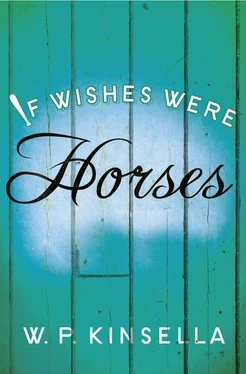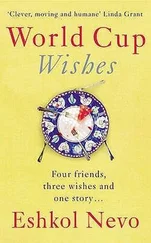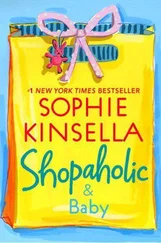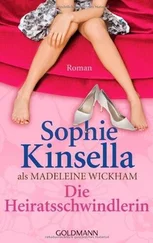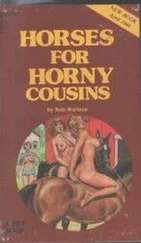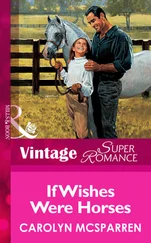‘I was gonna call the National Enquirer ,’ said Bertha, ‘but I couldn’t figure out how. I’ve never made a long-distance call.’
Buster grunted, grinned and nodded.
What had been somewhat of a road dwindled to a trail, then to tire tracks on sand. We drove another half-mile through sage, brittlebush and creosote trees, and parked in a gully.
We tramped over barren sand hills, past small hummocks sheathed in bleached grass. A lizard scuttled out of our way; some kind of large insect thumped against the knee of my pants.
‘See, here it is,’ said Bertha, as we arrived at the base of a dome-like hill. Two oblong, grid-like patterns were burned into the earth.
‘That’s where it landed.’
I knelt down and examined the tracks. Each one was the size of a very large snowshoe. The patterns had burned through the sparse grass and into the sandy soil, a heavy brand perhaps three-quarters of an inch deep.
‘We were laying right over here,’ Bertha said, shaking out a cigarette from a beat-up pack she extracted from the front pocket of her jeans. She pointed to a small, natural shelf in the side of the hill. ‘Fuckin’ near scared us to death, right Buster?’
Buster grinned and nodded.
I tried to imagine what could have made the imprints, tried to guess what Bertha and Buster had actually seen.
‘Well, do they look like flying saucer tracks?’ asked Bertha.
‘I’ve never had any first-hand experience,’ I said.
Bertha looked disappointed. Then she grabbed Buster’s arm, rubbing her nose against his bicep.
‘Tell him the surprise,’ she said.
Buster just smiled, a shifty-eyed, shit-eating smile.
‘They came back,’ said Bertha. ‘We first seen ’em two nights ago. They came last night and I bet they’re comin’ back tonight. I think it was because we didn’t run and didn’t have a gun or nothin’. Last night, they came and looked us over again. They kind of measured us, if you know what I mean.’
‘They?’ I said.
‘Well, you know, I could feel them. That machine made comforting sounds, like a baby when it’s talkin’ itself to sleep. But the light that came out of it touched us, like all over. Right, Buster?’
Buster smiled and nodded.
We drove back to the rickety, basementless house. The home belonged to Bertha’s mother, who arrived in a rusting Pontiac, accompanied by a couple of unkempt, tow-headed boys she must have retrieved from a babysitter.
The mother wore a grayish waitress uniform; her mud-colored hair was limp. She wasn’t much over thirty, but everything about her, including her clothes and hair, looked wilted and tired. She had probably been beautiful as a teenager, but now every part of her was slouching. I decided she had probably had a long succession of boyfriends, husbands and lovers just like Buster.
‘Geez, I thought reporters had better things to do than listen to dumb kids,’ she said, after Bertha introduced us. ‘Don’t tell me you believe this flying saucer crap. These kids are just looking for some attention.’
‘I photographed the tracks out there on the hill,’ I said a little defensively. ‘They’re unlike anything I’ve ever seen before. Besides, I make a point of checking out every lead,’ I added, trying to sound professional and gracious at the same time.
‘Suit yourself. Hey, I loved the way you nailed that little rat who was selling phony water softeners. He worked this area, you know, sold to the old lady in the yellow house across the way …’
Bertha’s mother served canned tomato soup thinned with water, and sandwiches containing one slice of a pinkish substance that may or may not have had a protein base, followed by instant coffee served in cracked mugs, accompanied by Carnation milk with two yellow lines dribbled down the label.
I phoned Rosslyn to tell her I’d be late. Looking back, I realize she didn’t even ask where I was or what I was working on. But then, I didn’t ask her how many people’s mouths she’d immortalized in plaster of Paris that afternoon. Our relationship was not in wonderful shape even before I became terminally unemployed.
I have no idea why I got together with Rosslyn. I suspect she had no idea why she chose me. After I retired from organized baseball I took a long holiday. I went to Honolulu. I wasn’t worried about finding work; I had a journalism degree to fall back on and a few dollars in the bank, though I’d never made big money in baseball. I was to some extent at loose ends, suffering, in a mild form, from the terrible letdown professional athletes undergo when they are suddenly thrust into the civilian world.
I met Rosslyn in a singles bar. She had her own business, was two years older than me, sensible, dedicated. She was, as they say, upwardly mobile, the direction I intended to be traveling. Rosslyn was everything the women I’d known throughout my baseball career were not. We also had Southern California in common; I had made my home there every off-season. A week after we returned from our Hawaiian holiday we moved in together. We both thought it was time to settle down; the fact that we weren’t the right people for each other was incidental.
At Bertha’s we watched TV on a dusty, finger-marked black-and-white set until the sun went down. Then the three of us got in Buster’s car and again headed for the desert.
We sat on the ledge above where Bertha and Buster had been when the spaceship first landed.
‘I wonder what they thought of us,’ Bertha said. ‘We had the sleeping bag and we were, like, going at it, if you know what I mean.’
‘A much better introduction to Earth than being met by a dozen armored tanks and a trigger-happy SWAT team,’ I said.
‘You do believe us, don’t you, Joe?’ Bertha asked.
I paused for a long time. ‘I believe you’ve seen something . I believe you believe what you’re telling me.’
Bertha smiled, and, as she did, her wide, placid face was suddenly lighted the color of pink neon by the spaceship flitting over the nearest hill like a gigantic firefly. It landed in the tracks it had previously established.
‘Son of a bitch!’ said Bertha.
The only other time I experienced anything similar was when I was sent into a game in Yankee Stadium in the ninth inning, before fifty thousand screaming fans, the bases loaded, two out, and our team up by two. I remember feeling like I might faint, then imagining how ridiculous I’d look, a couple of runs scoring as the third baseman tried to pry the ball out of my glove. I got out of the inning and game with one pitch: I hung a curve ball that Craig Nettles hit in the gap in left-center to empty the bases.
What did the spaceship look like? Visualize one of those egg-shaped, plastic containers in which pantyhose are packaged. Picture one fifteen feet long and five or six feet high; then imagine it full of pink cotton candy.
It glided in like a cartoon insect. Bertha had been remarkably accurate in her description of the vehicle. Once it landed it sat silently, glowing baby pink, for what must have approached ten minutes, emitting comforting sounds.
The three of us just stood, awe-struck. For the first five minutes Buster and I each held one of Bertha’s pudgy hands. I wanted to touch the craft, but I don’t know if I lacked the nerve or if I was prevented from walking forward by some force within the machine.
Finally, I remembered my camera, and I began photographing the craft. I scurried around snapping photos like a Japanese tourist.
All the time the spaceship was there I had the feeling I was being touched, investigated, ‘measured,’ as Bertha had said, by gentle, loving hands.
Gradually I relaxed. I finished photographing, or, more accurately, ran out of film, and ended as we had begun, the three of us holding hands. I have never felt so at peace.
Читать дальше
